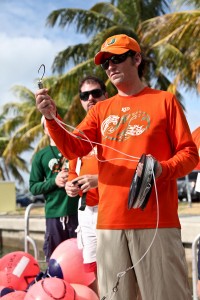
A typical Bahamian vacation includes sunny beaches, fruity drinks and ultimate relaxation. But not for one University of Miami professor.
Neil Hammerschlag, shark scientist, spends his time chasing the ocean’s toothier inhabitants that many beachgoers would prefer to avoid. On a recent three and a half day trip, Hammerschlag caught, tagged and released more than 20 sharks, many of which were more than 13 feet long.
He called it “a very successful trip.”
It wasn’t just experienced scientists on board, though. Through his organization, the R.J. Dunlap Marine Conservation Program, Hammerschlag gives high school students and other citizen scientists the opportunity to get up close and personal with the oceans’ top predators.
The program is a unique blend of outreach and cutting-edge research. When conducting projects that vary from analyzing the levels of mercury in shark fin soup to discovering the intricacies of tiger shark pregnancy, Hammerschlag has made sure that citizen participants don’t just go through the motions of data collection. Every GPS coordinate, tissue sample and measurement gathered is used in current graduate student research projects.
“Hammerschlag doesn’t want research to stay within the scientific community,” said Kyra Hartog, a senior who has interned with the program for the last four years. “He wants to expand that knowledge to anyone interested.”
Fiona Graham, a former intern and one of Hammerschlag’s current master’s students, agrees.
“Dr. Hammerschlag is one of those types of people where nothing is out of the question,” Graham said. “You need something, and his answer is always ‘yes, we can make that happen, let’s do it.’ It’s that ambition, I think, that has gotten the program to where it is today, and keeps it constantly evolving and reaching for that next step.”
During outreach programs on the R/V Endsley, the main research vessel used by the program, Hammerschlag often pulls sharks several times his size onto the specialized loading platform at the back of the boat. The ease with which Hammerschlag handles the sharks seems almost innate.
He readily admits that is not the case. During his first shark dive at the age of 15, he remembers being torn between nerves and fascination, anxiously working to keep up with the trip’s dive master.
“I wouldn’t say I fear them, but I have a healthy respect for them,” he said. “It is important to remember that they are a top predator.”
Though Hammerschlag has always been interested in the oceans, the native South African was landlocked at the age of 7 when his family moved to Canada. His love of the ocean was limited to summer vacations and summer internships once he started his studies at University of Toronto. It was at an internship for a shark research program in California that Hammerschlag’s passion came about.
“I realized this is my calling, and I kind of never looked back,” he said.
He continued on to get his master’s in marine biology at Nova Southeastern University and his Ph.D. in marine biology and fisheries at UM. After earning his doctorate in 2009, Hammerschlag was hired by UM as a research assistant professor. His main focus is research and the RJ Dunlap program, but he also teaches a graduate course in marine conservation biology.
Hammerschlag has created research opportunities for both undergraduate and graduate marine science students that allow the students to discover shark research much the same way that he first did. But these students would argue that they have received much more than time studying shark; they have also received a lifelong mentor and friend.
“Neil has been one of the biggest influences on my life,” said Emily Nelson, a junior and second-year R.J. Dunlap intern. “He completely invests in his students and will do everything he can to help them succeed.”







